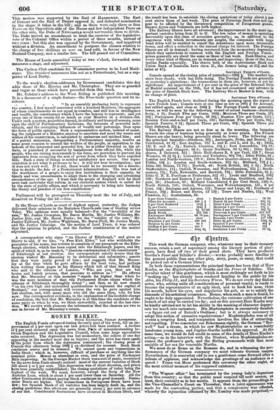t4t quirts.
This week the German company, who, whatever may be their treasury success, retain a sort of supremacy among the literary portion of play- goers, have fired off two of their grand shots. They have produced Goethe's Faust and Schiller's Bauber, —works probably more familiar to the general public than any other play, story, poem,, or essay, that could be picked out of a German library. In both these representations the principal figure has been that of Herr Kuehn, as the _Mephistopheles of Goethe and the Franz of Schiller. The peculiar talent of this gentleman, which is most strikingly set forth in his "making up," has already been rendered familiar to the public by his Alva, his Philip H., and his Secretary Warm. We do not every day find an actor, who, setting aside all considerations of personal vanity, is ready to become the representative of an ugly ideal, and to hook his nose, twist his mouth, hollow his eyes, and angularize his gait, so as to satisfy the demands of hisartistical conscience. Hence, when such a man is found, he ought to be duly appreciated. Nevertheless, the extreme cultivation of one branch of art may be carried too far ; and on this account Herr Kuehn may be kindly advisednot to let his ability in the marking of character degene- rate too much into caricature. His Mephistopheles is excessively fiendish —a figure cut out of Retzeh'e Outlines ; but is it always necessary to adopt this notion of excessive repulsiveness ? Mephistopheles was at all events a tempting fiend, and temptation involves the idea of attracting, not repelling. If we remember our Eckermann rightly, the German " Bos- well " had a dream, in which he saw Mephistopheles as a remarkably handsome young man, and Jupiter-Goethe nodded his approval. At the same time, we would do full credit to some of the details of Herr Kuehn's acting,—as in the interview with the Student, when Mephistopheles as- sumes the professor's garb, and the flirting promenade with that most amiable of her sex the venerable Martha.
We must do at Rome as the Romans do, and in witnessing the per- formances of the German company we must tolerate German usages. Nevertheless, it is somewhat odd to see a gentleman come forward after a tribute of applause, and acknowledge the greetings of an audience in a speech ! Franz von Moor performed this ceremony the other night, at the most critical moment of his supposed existence.


























 Previous page
Previous page